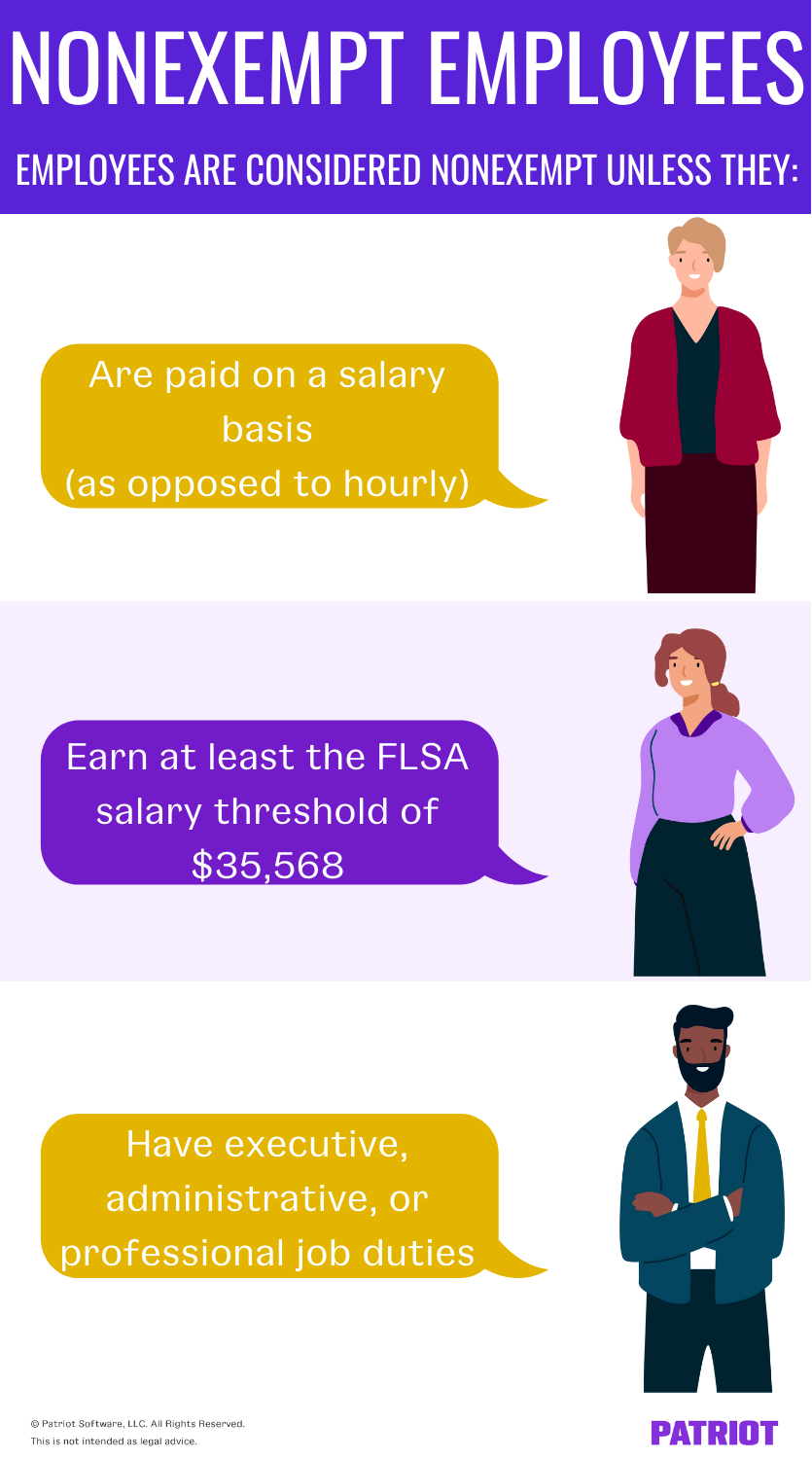Worker classification is critical. After you’ve narrowed down whether a worker is an independent contractor vs. employee, you’re not done. You need to also figure out if an employee is nonexempt. What is a nonexempt employee?
When an employee has nonexempt status, the Fair Labor Standards Act’s (FLSA) minimum wage and overtime laws come into play.
If you want to avoid FLSA penalties, you must understand nonexempt employee rules.
What is a nonexempt employee?
Employees with nonexempt worker status are not exempt from FLSA regulations. This means nonexempt employees are subject to minimum wage and overtime pay laws. Nonexempt employees are entitled to earn at least the federal, state, or local minimum wage—whichever is highest. And, employers must pay nonexempt employees overtime pay for any hours worked beyond 40 in a workweek.
An employee can either be exempt vs. nonexempt. If the employee is exempt, you do not owe them overtime wages.
How do you know if an employee is nonexempt?
The Fair Labor Standards Act sets requirements that help you accurately categorize your employee as exempt or nonexempt.
Employees are considered nonexempt unless they meet all three of the following requirements:
- Earns a salary
- Makes at least $35,568 (2020)
- Has high-level job responsibilities that qualify for exemption
Types of wages
Nonexempt employees can either earn hourly or salary wages.
Don’t fall into the trap of thinking that salaried employees are automatically exempt from overtime pay. Although it’s true that all exempt employees earn salaries, not all nonexempt employees earn hourly wages.
In many cases, nonexempt employees earn hourly wages. But, you can also have a nonexempt salaried employee.
If your employee earns a salary, check to see if they meet the other two FLSA qualifications before categorizing them as exempt.
Salary threshold
Employees who earn below the FLSA salary threshold are nonexempt. In 2019, the U.S. Department of Labor offered a new proposal to change the salary threshold from $23,660 ($455 per week) to $35,568 ($684 per week). The DOL new overtime rule takes effect in January 2020.
Job responsibilities
If an employee does not have job duties that are considered executive, administrative, or professional, they are nonexempt.
Employees with executive job duties supervise at least two employees as a major part of their position. And, an employee with executive job duties can hire or fire employees.
Administrative job duties include responsibilities that support the business’s general business activities. Also, the employee’s primary duty requires them to use independent judgment.
Employees who have professional job duties perform work using a high level of skill and knowledge. The advanced knowledge must be in a field of science or learning. Typically, an employee must take courses to gain advanced knowledge.
A closer look at nonexempt employee rights
Nonexempt employees have a right to earn at least the minimum wage and overtime pay. Read on to learn more about your obligations for both.
Minimum wage
You must provide at least the minimum wage to nonexempt employees. The current federal minimum wage is $7.25 per hour.
Many states set their own minimum wage rate. And, some cities create a local minimum wage. Pay employees the highest minimum wage that applies to your locality.
Overtime pay
Nonexempt employees are entitled to overtime pay. Overtime wages are 1.5 times an employee’s regular hourly wage.
You must provide overtime wages when a nonexempt employee works more than 40 hours in a workweek.
Nonexempt status examples
Take a look at the examples below. Before looking at the answers, try to figure out whether the employee is nonexempt.
Example 1
Let’s say you hire an employee to work as a technician.
The employee does not have authority over other employees. And, they do not use independent judgment. The employee also does not need advanced knowledge to perform their job.
The employee earns a salary.
You pay the employee $38,000 per year.
Is the employee considered nonexempt? Yes
Example 2
You hire an employee to work 20 hours per week as a receptionist.
The employee’s job responsibilities include answering phone calls and transferring callers to the correct departments.
The employee earns hourly wages.
You pay the employee $240 per week.
Is the employee considered nonexempt? Yes
Example 3
You hire an IT technician for your business.
The technician has advanced knowledge in their field. They gained knowledge by taking courses.
The IT technician earns a salary.
You pay the IT technician $55,000 per year.
Is the employee considered nonexempt? No
Need a reliable way to pay your employees? Patriot’s online payroll software streamlines your payroll processing and makes it easy to pay your exempt and nonexempt workers. Get your free trial today!
This article has been updated from its original publication date of 03/16/2012.
This is not intended as legal advice; for more information, please click here.

